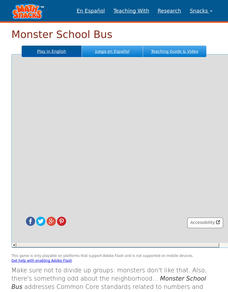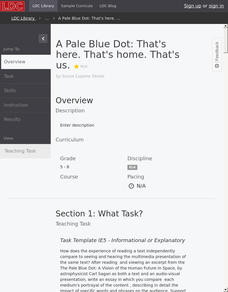New Mexico State University
Number Rights
You do not have to be whole to be important. Individuals watch a video on the importance of rational numbers on the number line. Scholars use their knowledge to rename numbers on the number line as well as place rationals on a number...
New Mexico State University
Pearl Diver
Dive into the number line. Learners play a computer game that revolves around a number line as they try to collect pearls by diving at locations on a number line. As the game progresses, dive locations change from simple whole numbers to...
New Mexico State University
Monster School Bus
Load up the bus. Pupils play a game where they control a bus to pick up a certain number of monsters for school. Learners develop strategies to make sure they have a full load and score the most rewards. As scholars work through the...
New Mexico State University
Game Over Gopher
Coordinate an attack on hungry gophers. Scholars play a game that relies on placing objects on the coordinate plane to stop gophers from eating a carrot. As the game levels increase, learners encounter different scales and the need to...
Collaborative for Academic, Social, and Emotional Learning (CASEL)
Examples of Social and Emotional Learning in Elementary Mathematics Instruction
A 12-page document lists an abundance of math-related activities that boost social and emotional topics; self-awareness, self-management, social awareness, relationship skills, and responsible decision making.
Indiana Department of Education
Social Emotional Toolkit
Looking for some tools to help you incorporate social and emotional learning into your curriculum? Then check out this 79-page kit packed with ideas for developing social-emotional learning competencies. The first section provides...
Core Knowledge Foundation
Maya, Aztec, and Inca Civilizations
A 10-lesson unit explores the Maya, Aztec, and Inca civilizations. Over the course of two weeks, scholars read nonfiction excerpts, discuss their findings, and complete activities. An assessment equipped with multiple choice and matching...
EngageNY
Grade 5 Math Module 1, Topic D, Lesson 10
Take a little bit away. The 10th section of an 18-part unit introduces subtraction of decimals. Scholars use a place value chart like they did with addition of decimals to organize and represent the problem. After using the place value...
EngageNY
Grade 5 Math Module 1, Topic D, Lesson 9
Introduces addition of decimals by using unit notation to represent the problem. Pupils use a place value chart to decompose the numbers and then add before connecting to the standard algorithm.
EngageNY
Grade 5 Math Module 1, Topic C, Lesson 8
Go another round on rounding. Pupils refine their learned rounding skills in the eighth installment in an 18-part unit on decimals. The lesson takes away some of the previous scaffolding to encourage scholars to use the procedures that...
EngageNY
Grade 5 Math Module 1, Topic B, Lesson 6
Which is bigger? The sixth installment in an 18-part series covering decimals provides a instructional activity on comparing decimals to the thousandths. Teachers use place value to help class members compare and order decimals....
EngageNY
Grade 5 Math Module 1, Topic B, Lesson 5
There is more than one way to write a number. The lesson plan provides teachers with a way to teach reading and writing decimals to thousandths using standard, expanded, and unit forms. Pupils work through in-class and homework...
EngageNY
Grade 5 Math Module 1, Topic A, Lesson 4
Convert with exponents. The fourth lesson in a series of 18 uses powers of 10 to convert within the metric system. Scholars use their fourth grade knowledge of conversions to write and use the conversion factors containing exponents....
EngageNY
Grade 5 Math Module 1, Topic A, Lesson 3
The activity introduces exponents as a way to write powers of 10 and to associate those powers with place value. Pupils practice writing powers of 10 with exponents along with multiplying numbers by powers of 10. The resource is the...
EngageNY
Grade 5 Math Module 1, Topic A, Lesson 2
What are the place value patterns? An informative lesson plan helps scholars build upon their knowledge of place value to see patterns when multiplying and dividing by powers of 10. Classmates begin the second installment by reviewing...
EngageNY
Grade 5 Math Module 1, Topic A, Lesson 1
Extend the place value system. The first lesson plan in a series of 18 extends the place value system to millions through thousandths. Using place value charts, pupils see how the value of a digit changes as it moves places. Teachers use...
Literacy Design Collaborative
A Pale Blue Dot: That's Here. That's Home. That's Us.
21st-century learners live in such a visual world that many are unused to letting their minds imagine the picture that words create. An excerpt from Carl Sagan's lecture, "The Pale Blue Dot: A Vision of the Human Future in Space,"...
Steve Spangler Science
Halloween Dry Ice Secrets
Want to use dry ice in your classroom this Halloween but you're not sure how? A thorough packet of 13 dry ice activities showcases engaging ways to bring chemistry to life this October.
IPA Productions
A Christmas Carol - The Story
Thirty-six pages familiarize scholars with the story and vocabulary of A Christmas Carol by Charles Dickens. After reading and listening to an abbreviated version of the holiday tale learners show what they know about the sequence of...
New York City Department of Education
Peter’s Garden
Watch scholars' understanding of fractions bloom. The resource presents a performance task where the fractions are equal parts from the same whole, and mathematicians must use them to solve problems about a grade level garden. Teachers...
GLSEN, Inc.
Ready, Set, Respect!
Instill the importance of respect in your classroom with a comprehensive unit that focuses on positive behavior in and outside of school. Three parts, each separated into four grade-specific lessons, cover bullying, bias, name-calling,...
Purdue University
Field Trip Snack Holder
Is light related to insulation? An informative hands-on STEM activity demonstrates how light affects temperature. First, the class investigates how light passes through different mediums and how that relates to temperature. Then,...
Purdue University
Simple Machines – Dog Gone It!
How can people use simple machines to solve real-world STEM problems? Learn about simple machines using a hands-on, project-based learning activity. First, pupils investigate and evaluate simple machines. Then, they receive a task that...
Cornell University
Polymers: Instant Snow
Is it easy to make snow? Scholars use critical thinking skills as they investigate the concept of polymers by making snow. The class tests several different variables and takes measurements over the course of several days. They then...

























